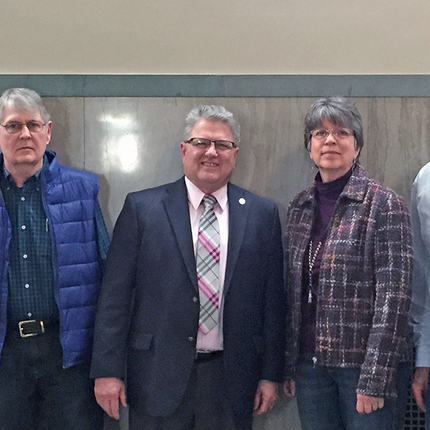By Johnathan Hladik, former policy director
Farmers Joe and Carol Schmieding purchased land in Seward County in 1987, land that included a driveway and waterway that spanned forty acres. However, the boundary line was not clearly marked, and neighbors used this driveway for farming purposes disputing ownership of this parcel.
In 2006, Joe discovered a survey marker which established the true boundary line. This marker clarified that the disputed parcel was part of the Schmieding property.
In 2010, the owners made preparations to modify both the driveway and waterway. At that point, the neighbors brought suit. The court determined that although the Schmieding family was record owners, the neighbors were permitted to acquire the parcel via adverse possession by their continuous use of the driveway. This in spite of the fact that the Schmieding family paid all taxes and assessments on this property during ownership, while the neighbors paid nothing.
What is adverse possession?
Adverse possession is an important doctrine that encourages productive use of property. Land that is neglected, ignored or forgotten is of little societal value. Further, an abandoned parcel can be a financial strain for state and local governments and a source of frustration for neighboring landowners.
However, this doctrine can be manipulated to take advantage of landowners acting in good faith. Continued and active payment of property taxes on the relevant parcel is an indication the record owner is aware of ownership and actively maintaining this investment.
In these cases, a trespassing party should not be financially rewarded for his or her misdeeds.
What happened in the Schmieding family case?
Case law requires that four elements must be proven to establish adverse possession in Nebraska.
Use of the property must be:
1. Actual, requiring use of the property.
2. Exclusive, meaning only the trespasser is in possession.
3. Open and notorious, meaning occupancy is not hidden from the owner or general public.
4. Hostile, done without permission of the owner.
A fifth element is required by statute. The property use must also be:
5. Continuous over a 10-year period.
Under current law, the record owner is responsible for any taxes assessed on the relevant parcel during a 10-year statutory period, even though the trespasser has successfully demonstrated hostile, open, actual, and exclusive use of that property for 10 years.
Here, the trespassee is paying taxes on property that only the trespasser is using.
What can we do?
Several states have taken steps to prevent this outcome.
- 18 states include payment of property tax as a sixth element required to prove adverse possession. Each of these have enacted legislation requiring the trespasser pay property taxes on the parcel during all or a portion of the continuous period of use.
- One state, Colorado, takes a modified approach. Here it is only required that the trespasser pay all property taxes owed on the parcel for seven of 18 years of continuous use. The trespasser must also compensate the record owner for any taxes paid over the remaining 11 years.
- A 19th state, Alaska, makes this distinction via case law. There it is not a requirement that property taxes be paid by the trespasser, but is considered proof in an adverse possession proceeding.
What about Nebraska?
LB 359 was recently introduced in the Nebraska Legislature.
The proposed bill:
- Retains the intent and purpose of adverse possession by leaving in place each of the five key elements.
- Falls short of requiring that the trespassing party pay taxes during the statutory period, as other states have chosen to do. Doing so may dissuade otherwise beneficial claims.
- Encourages an equitable approach by instead requiring that a record owner who in good faith pays all taxes due on his or her property will be compensated for those payments when that parcel is lost to a claim of adverse possession.
Boundary disputes are not foreign to rural landowners. In the case of the Schmieding family, a legal loophole was exploited to dispossess them of their land and investments. LB 359 takes a key step toward preventing this unjust outcome. A second piece of legislation, requiring payment of property taxes as a component to a successful adverse possession claim, is being discussed for 2018. We urge you to contact your senator and ask them to protect the property rights of landowners by supporting these efforts.
Feature photo: L-R, Mary Cummins, Hal Cummins, Sen. Mark Kolterman, Carol Schmieding and Joe Schmieding yesterday at the Unicameral. The Cummins, of Waco, have farmed in York County for 30 years. Hal's father lost land due to adverse possession. The Schmiedings, of rural Seward, had an adverse possession suit brought against them by neighbors. Each couple testified in favor of LB 359 in Lincoln yesterday.





